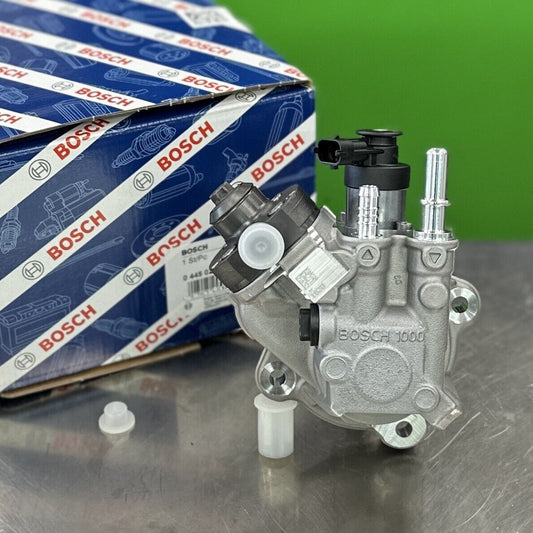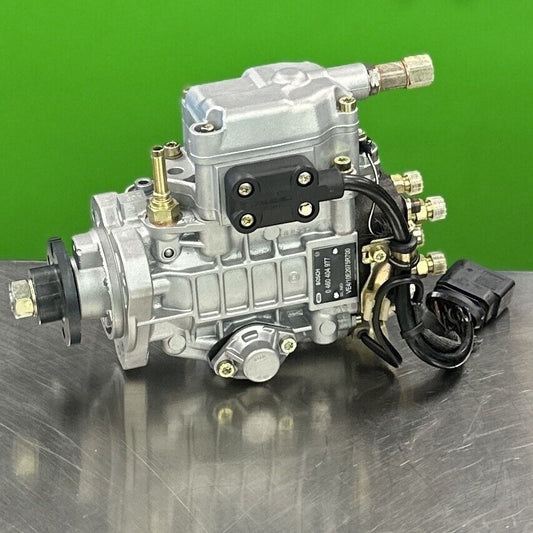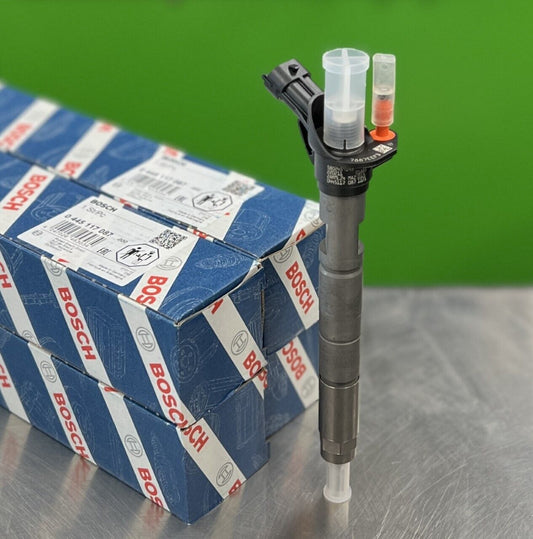Fuel Injector Failure: What To Do When Disaster Strikes
When it comes to your vehicle's fuel injector, disaster striking can feel like a sudden explosion in the engine of your car. Recognizing the signs of fuel injector failure is crucial to prevent further damage and costly repairs. From subtle symptoms to major malfunctions, understanding what to do when facing fuel injector issues can save you from being stranded on the side of the road.
Recognizing the Signs of Fuel Injector Failure
Recognizing the signs of fuel injector failure is crucial for maintaining the performance and efficiency of your vehicle. When your fuel injectors start to malfunction, it can lead to a range of issues that affect your engine's operation. One of the most common symptoms of fuel injector problems is a noticeable decrease in fuel efficiency. If you find yourself filling up the tank more frequently than usual, it could be a sign that your fuel injectors are not delivering fuel properly.
Another indication of fuel injector failure is rough idling or engine misfires. When the fuel injectors are clogged or not functioning correctly, it can result in uneven engine performance, causing the vehicle to shake or vibrate while idling. Additionally, if you experience difficulty starting your car or notice a lack of power during acceleration, it may be due to fuel injector issues affecting the fuel delivery to the engine.
Furthermore, a strong smell of gasoline inside or outside the vehicle could signal a leaking fuel injector. Leaking fuel injectors can pose a serious safety hazard and should be addressed immediately. Additionally, black smoke coming from the exhaust pipe or a rough engine sound could indicate a rich fuel mixture caused by faulty injectors.
To effectively diagnose fuel injector problems, it is essential to pay attention to any warning signs and seek professional help for a thorough inspection. Ignoring the symptoms of fuel injector failure can lead to more significant engine issues and potentially costly repairs down the road. By recognizing these common signs early on, you can take proactive measures to address the problem and prevent further damage to your vehicle.
Causes of Fuel Injector Failure
When it comes to fuel injector failure, there are several factors that can contribute to this troublesome issue. Understanding the causes behind fuel injector malfunctions is crucial in preventing potential disasters on the road. Let's delve into the common reasons why fuel injectors fail and how they can impact the performance of your vehicle.
One of the primary causes of fuel injector failure is poor maintenance practices. Neglecting regular maintenance, such as changing fuel filters and cleaning injectors, can lead to the buildup of dirt, debris, and carbon deposits within the injectors. This buildup can obstruct the flow of fuel and disrupt the injector's spray pattern, resulting in inefficient combustion and engine performance issues.
Contaminated fuel is another major culprit behind fuel injector problems. Fuel that contains impurities, water, or sediment can clog the injectors and cause them to malfunction. Using low-quality or old fuel can introduce harmful substances into the fuel system, leading to corrosion and damage to the injector components.
Electrical issues also play a significant role in fuel injector failure. Faulty wiring, damaged connectors, or issues with the engine control unit (ECU) can disrupt the communication between the fuel injectors and the vehicle's computer system. This can result in improper fuel delivery, misfiring, and overall engine performance degradation.
Moreover, overheating of the engine can contribute to fuel injector problems. High temperatures under the hood can cause the fuel to vaporize prematurely in the injectors, leading to poor atomization and combustion. This can result in rough idling, decreased fuel efficiency, and potential engine damage if left unaddressed.
Furthermore, using additives or cleaners that are not compatible with the fuel system can also trigger fuel injector failure. Certain chemicals may react negatively with the injector components, causing corrosion, erosion, or deterioration over time. It is essential to use only recommended fuel additives and cleaners to maintain the health of your fuel injectors.
In conclusion, being aware of the various causes of fuel injector failure is essential for preserving the longevity and efficiency of your vehicle's fuel system. By addressing these underlying issues proactively and seeking timely professional assistance when needed, you can avoid the inconvenience and potential hazards associated with fuel injector malfunctions.
Preventive Maintenance Tips for Fuel Injectors
When it comes to ensuring the longevity and efficiency of your vehicle's fuel injectors, preventive maintenance plays a crucial role. By implementing a few simple yet effective tips, you can significantly reduce the risk of fuel injector failure and prolong the lifespan of these essential components.
One of the most important preventive maintenance tips for fuel injectors is to use high-quality fuel from reputable sources. Contaminated or low-grade fuel can quickly clog the injectors, leading to poor engine performance and potential damage. Investing in premium fuel can help keep your injectors clean and functioning optimally.
Regular cleaning procedures are also key to maintaining healthy fuel injectors. Over time, carbon deposits and debris can accumulate in the injectors, affecting their spray pattern and overall performance. Consider using fuel injector cleaning additives or having a professional cleaning service performed periodically to prevent buildup and ensure smooth operation.
Another crucial aspect of preventive maintenance is to inspect and replace fuel filters as needed. Fuel filters are designed to catch impurities and debris before they reach the injectors. A clogged or dirty fuel filter can restrict fuel flow and put additional strain on the injectors, potentially causing them to fail prematurely. Regularly checking and replacing fuel filters can help prevent injector issues.
Additionally, monitoring fuel system pressure can help detect potential problems early on. A drop in fuel pressure can indicate issues with the injectors or other components of the fuel delivery system. By keeping an eye on fuel pressure readings and addressing any abnormalities promptly, you can prevent more significant issues from developing.
Lastly, following the manufacturer's maintenance schedule is essential for keeping your fuel injectors in top condition. Regular tune-ups, inspections, and servicing can help identify and address potential issues before they escalate into costly repairs. By staying proactive and adhering to recommended maintenance intervals, you can ensure that your fuel injectors perform reliably for years to come.
DIY Troubleshooting for Fuel Injector Issues
When it comes to dealing with fuel injector problems on your own, there are a few key steps you can take to troubleshoot and potentially resolve issues before seeking professional help. By following these DIY troubleshooting tips, you may be able to save time and money while ensuring your vehicle runs smoothly.
One of the first things to check when facing fuel injector issues is the fuel filter. A clogged fuel filter can restrict the flow of fuel to the injectors, leading to poor engine performance. By inspecting and replacing the fuel filter if necessary, you can eliminate a common cause of injector problems.
Another important aspect to consider is the fuel quality. Using low-quality or contaminated fuel can quickly damage fuel injectors and other engine components. Make sure to always fill up at reputable gas stations and consider using fuel additives to keep the injectors clean.
Additionally, checking for leaks in the fuel system is crucial when troubleshooting injector issues. A leaky fuel line or injector O-ring can cause fuel to escape, leading to a drop in fuel pressure and engine performance. Inspect the fuel system carefully and replace any damaged components promptly.
When diagnosing fuel injector problems, it's also essential to inspect the electrical connections related to the injectors. Loose or corroded connections can disrupt the injector's function, causing misfires and rough idling. Ensure that all electrical connections are secure and free of debris to maintain proper injector operation.
Furthermore, performing a fuel injector cleaning can help address minor issues and improve injector performance. Using a quality fuel injector cleaner can remove deposits and buildup inside the injectors, restoring proper fuel atomization and combustion efficiency.
Lastly, if you encounter persistent fuel injector problems that cannot be resolved through DIY troubleshooting, it may be time to seek professional assistance. A certified mechanic can perform advanced diagnostics and repairs to ensure your fuel injectors function optimally.
By following these DIY troubleshooting tips and staying proactive in maintaining your fuel injectors, you can minimize the risk of unexpected breakdowns and costly repairs. Remember, early detection and prompt action are key to keeping your vehicle running smoothly and efficiently.
Professional Repair Options for Fuel Injector Failure
When it comes to dealing with fuel injector failure, professional repair options can vary depending on the severity of the issue. It's crucial to address fuel injector problems promptly to prevent further damage to your vehicle's engine and ensure optimal performance. Let's explore the different repair options available for severe fuel injector issues:
1. Cleaning and Flushing: In some cases, fuel injector problems can be resolved through professional cleaning and flushing services. This process helps remove any built-up deposits or contaminants that may be affecting the injector's performance. A certified mechanic can perform this service to restore your fuel injectors to proper functioning.
2. Rebuilding Fuel Injectors: If the damage to the fuel injectors is more extensive, rebuilding them may be a cost-effective solution. During the rebuilding process, the injectors are disassembled, cleaned, and any faulty components are replaced. This option can help save money compared to purchasing new injectors while still ensuring reliable performance.
3. Replacement of Fuel Injectors: In cases where the fuel injectors are beyond repair or rebuilding, replacement is the best course of action. Certified mechanics can install new fuel injectors that are compatible with your vehicle's make and model. This option guarantees optimal fuel delivery and engine efficiency, restoring your vehicle's performance.
4. Diagnostic Testing: Before proceeding with any repair option, it's essential to conduct diagnostic testing to pinpoint the exact cause of the fuel injector failure. Through advanced diagnostic tools, mechanics can identify the underlying issues affecting the injectors and recommend the most suitable repair solution.
5. Consultation with Experts: When facing severe fuel injector problems, seeking advice from automotive experts is advisable. Experienced mechanics can provide insights into the best repair options based on the specific symptoms and condition of your fuel injectors. Their expertise can help you make informed decisions regarding the repair process.
By exploring these professional repair options for fuel injector failure, you can address issues promptly and effectively restore your vehicle's performance. Whether opting for cleaning, rebuilding, or replacement, consulting with certified mechanics ensures that your fuel injectors receive the necessary care and attention they require.
```htmlFrequently Asked Questions
-
What are the common signs of fuel injector failure?
Common signs of fuel injector failure include engine misfires, rough idling, poor fuel efficiency, and a noticeable decrease in performance. If you experience any of these symptoms, it's crucial to have your fuel injectors inspected by a professional to prevent further damage.
-
What can cause fuel injector problems?
Fuel injector issues can be caused by various factors such as clogging due to dirt or debris, electrical faults, using low-quality fuel, or even regular wear and tear over time. Proper maintenance and using quality fuel can help prevent these problems from occurring.
-
Can I troubleshoot fuel injector problems on my own?
While basic troubleshooting like checking for loose connections or cleaning the injectors with a fuel system cleaner can be done at home, more complex issues should be handled by a professional mechanic. Attempting to repair advanced fuel injector problems without the necessary expertise can lead to further damage.
-
How often should fuel injectors be cleaned?
The frequency of fuel injector cleaning depends on various factors such as the quality of fuel used, driving conditions, and the age of the vehicle. As a general guideline, it is recommended to clean fuel injectors every 30,000 miles or as advised in your vehicle's maintenance schedule to ensure optimal performance.
-
Is it necessary to replace all fuel injectors if one fails?
In most cases, it is not necessary to replace all fuel injectors if one fails. A professional mechanic can diagnose the specific issue and recommend whether cleaning, repairing, or replacing the affected injector is sufficient. Replacing all injectors is typically reserved for situations where multiple injectors are failing simultaneously.



